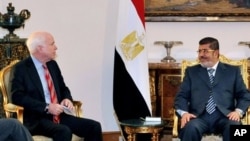CAIRO —
Egyptian President Mohamed Morsi says vitriolic comments he made against Jews and Zionists three years ago had been taken out of context, an explanation that fell short of a U.S. call for him to repudiate the remarks.
The New York Times said it had obtained video of a speech by Morsi in 2010, when he was already a leading figure in the Muslim Brotherhood opposition movement, in which he urged Egyptians to "nurse our children and our grandchildren on hatred" for Jews and Zionists.
In a television interview that the paper said he made months later, Morsi described Zionists as "these bloodsuckers who attack the Palestinians, these warmongers, the descendants of apes and pigs."
Footage of the latter commentary was viewed on YouTube by Reuters.
Morsi told a delegation of U.S. senators visiting Cairo on Wednesday that the remarks needed to be put "in the context in which they were said," his spokesman said in a prepared statement.
That context was Israeli "aggression" against Palestinians in the Gaza Strip, the spokesman said, a possible reference to an Israeli military operation in Gaza in 2008 and 2009.
Morsi's comments appeared at odds with the diplomatic, moderate image the Islamist leader has sought to convey since taking office last year and may stir unease among Egypt's Western allies, whose help he needs to weather a financial crisis.
For Washington, which was a staunch ally of Egypt's former leader Hosni Mubarak until he was overthrown in 2011 and is now trying to build a dependable relationship with Morsi, the remarks will have made uncomfortable viewing.
The United States provides Egypt with $1.3 billion in military aid each year - support that flows from Cairo's 1979 peace treaty with Israel.
Strong disapproval
Morsi has promised repeatedly to respect the treaty, a cornerstone of U.S. policy in the Middle East, since becoming Egypt's first democratically elected president last June.
He worked with U.S. President Barack Obama's administration to help broker a ceasefire between Israel and the Palestinian Islamist movement Hamas in Gaza late last year.
The U.S. delegation, led by Senator John McCain, said it had expressed strong disapproval of Morsi's remarks about Jews.
"We had a constructive discussion on this subject," said McCain. "We leave it to the president to make any further comments on this matter that he may wish."
Senator Richard Blumenthal said they had "expressed our view in no uncertain terms," and that Morsi's remarks "counter the goal of the friendship between our two peoples."
Morsi told the delegation he was committed to freedom of religion and belief, his spokesman said, adding: "his Excellency [Morsi] pointed out the need to distinguish between the Jewish religion, and those who belong to it, and violent actions against defenseless Palestinians."
White House spokesman Jay Carney said on Tuesday that the language Morsi used was "deeply offensive" and that U.S. officials had raised its concerns with Egypt's government.
Carney called on Morsi to "make clear that he respects people of all faiths and that this type of rhetoric is not acceptable or productive in a democratic Egypt."
The New York Times said it had obtained video of a speech by Morsi in 2010, when he was already a leading figure in the Muslim Brotherhood opposition movement, in which he urged Egyptians to "nurse our children and our grandchildren on hatred" for Jews and Zionists.
In a television interview that the paper said he made months later, Morsi described Zionists as "these bloodsuckers who attack the Palestinians, these warmongers, the descendants of apes and pigs."
Footage of the latter commentary was viewed on YouTube by Reuters.
Morsi told a delegation of U.S. senators visiting Cairo on Wednesday that the remarks needed to be put "in the context in which they were said," his spokesman said in a prepared statement.
That context was Israeli "aggression" against Palestinians in the Gaza Strip, the spokesman said, a possible reference to an Israeli military operation in Gaza in 2008 and 2009.
Morsi's comments appeared at odds with the diplomatic, moderate image the Islamist leader has sought to convey since taking office last year and may stir unease among Egypt's Western allies, whose help he needs to weather a financial crisis.
For Washington, which was a staunch ally of Egypt's former leader Hosni Mubarak until he was overthrown in 2011 and is now trying to build a dependable relationship with Morsi, the remarks will have made uncomfortable viewing.
The United States provides Egypt with $1.3 billion in military aid each year - support that flows from Cairo's 1979 peace treaty with Israel.
Strong disapproval
Morsi has promised repeatedly to respect the treaty, a cornerstone of U.S. policy in the Middle East, since becoming Egypt's first democratically elected president last June.
He worked with U.S. President Barack Obama's administration to help broker a ceasefire between Israel and the Palestinian Islamist movement Hamas in Gaza late last year.
The U.S. delegation, led by Senator John McCain, said it had expressed strong disapproval of Morsi's remarks about Jews.
"We had a constructive discussion on this subject," said McCain. "We leave it to the president to make any further comments on this matter that he may wish."
Senator Richard Blumenthal said they had "expressed our view in no uncertain terms," and that Morsi's remarks "counter the goal of the friendship between our two peoples."
Morsi told the delegation he was committed to freedom of religion and belief, his spokesman said, adding: "his Excellency [Morsi] pointed out the need to distinguish between the Jewish religion, and those who belong to it, and violent actions against defenseless Palestinians."
White House spokesman Jay Carney said on Tuesday that the language Morsi used was "deeply offensive" and that U.S. officials had raised its concerns with Egypt's government.
Carney called on Morsi to "make clear that he respects people of all faiths and that this type of rhetoric is not acceptable or productive in a democratic Egypt."





